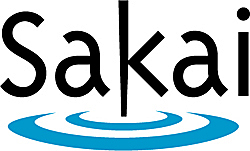 I'll be attending the Sakai Conference in Boston July 8-10. In case you're unfamiliar with Sakai, here's a quick rundown, followed by reasons why you should attend:
I'll be attending the Sakai Conference in Boston July 8-10. In case you're unfamiliar with Sakai, here's a quick rundown, followed by reasons why you should attend:Sakai is an open source learning environment developed by and for educators. As the Sakai Project website explains,
The Sakai Collaboration and Learning Environment (CLE) is a flexible, enterprise application that supports teaching, learning and scholarly collaboration in either fully or partially online environments environments.... Instructors teach in a variety of different styles using a wide array of methods. Sakai meets the needs of the institution, the individual instructor and students though its highly customizable nature. Sakai’s architecture is modular and individual instructors can select the tools they want available for their class. Or you can configure sites that are specifically designed for research collaboration or administrative work groups. And because the source code is freely available, you always have the option of changing or adding a feature that would make Sakai work event better on your campus.

The conference is intended to highlight work with Sakai by designers, administrators, faculty, and students. A key theme in most of the scheduled sessions is collaboration, not only across a single university but across educational institutions. Sessions are organized in the following tracks:
- Building Sakai: the technical aspects of Sakai enterprise development--requirements analysis, design, code, quality assurance, documentation and release management--hold center stage in this track. User experience design, scalability and performance, interoperability, development and presentation frameworks, programming best practices, and testing strategies are but a few of the many topics to be discussed and debated.
- Deploying Sakai: planning a Sakai pilot or production rollout, have questions regarding configuration or administration or need advice on how best to train and support your user community, then the deployment track will interest you. Implementing and supporting Sakai at both large and small institutions will be examined with a goal of elucidating best practices for IT managers, system administrators, support staff and trainers.
- Using Sakai: explore the teaching and learning, research and project collaboration capabilities of the Sakai Collaboration and Learning Environment. Sessions will examine effective learning and teaching practices, articulate strategies for facilitating research and project team collaboration, as well as confront the challenges of improving Sakai workflows, usability and accessibility.
- Multiple Audiences: this track features sessions of general interest to the Sakai Community or presentations that span the problem domains otherwise demarcated by our other session tracks.
- Sakai Showcase: the Sakai Community's goal of producing innovative software for higher education is on display in this track. Interactive demonstrations and tutorials focusing on new or refactored Sakai tools and services provide a snapshot of community-source software development in action.
And here's why you should attend:
- First, I'd love to meet you.
- Second, Sakai collaborators are on the front lines of the open source and open education movement, and they're thinking about participatory design and opening up education in exciting, innovative ways.
- Third, the keynote speaker is Vijay Kumar, the director of MIT's Office of Educational Innovation and Technology and, more importantly, a key figure in the open education movement. He'll be speaking at 8:30 a.m. on July 8, and you can bet I'll be as close to the front row as I can get for it.
- Fourth, Boston is a great place to be in early July. You can come early and get a glimpse of our world-famous Independence Day celebrations, or you can stay late and enjoy the post-July 4th quiet.
You should come to the conference if any of these keywords interest you: open education, open source, open access, online learning networks, supporting higher education and learning, social revolution.






No comments:
Post a Comment